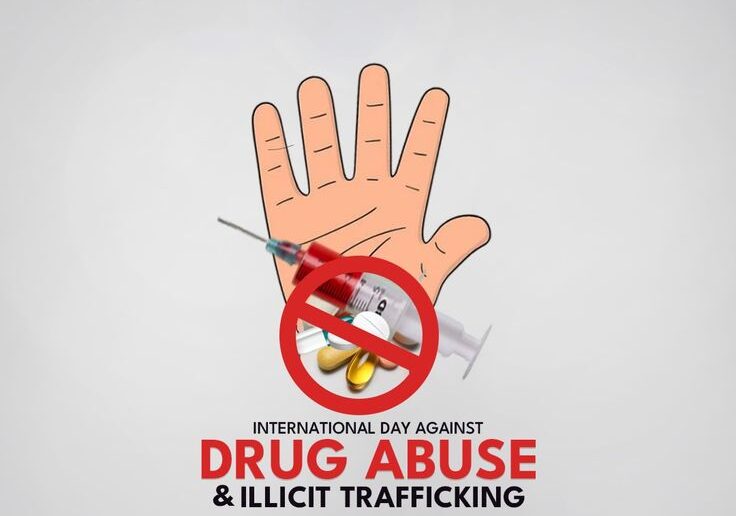International Day Against Drug Abuse and Illicit Trafficking: A Powerful Call to Action
Introduction
The International Day Against Drug Abuse and Illicit Trafficking is observed every year on June 26th to raise awareness about the dangers of drug abuse and the devastating effects of illicit drug trafficking. This day serves as a reminder of the global efforts needed to fight against drug-related crimes, promote public health, and protect vulnerable communities from the harmful effects of drugs.
This observance, led by the United Nations (UN), has become a critical part of the global strategy to reduce the impact of drugs on individuals, families, and society at large. On this day, governments, non-governmental organizations (NGOs), and activists come together to create awareness, advocate for drug prevention, and push for stronger international cooperation to combat the illegal drug trade.
History of International Day Against Drug Abuse and Illicit Trafficking
The origins of this important day can be traced back to 1987, when the United Nations General Assembly passed a resolution designating June 26th as the International Day Against Drug Abuse and Illicit Trafficking. The aim was to highlight the alarming growth of drug abuse worldwide and to acknowledge the efforts needed to combat the illicit drug trade. The day also aimed to highlight the devastating impact of drugs on individuals, families, and communities.
This day is not just about awareness but also about inspiring collective action. In the years following its inception, the UN began using the day to promote global strategies for drug prevention, treatment, and rehabilitation. The annual observance is used as a platform for countries to showcase their progress, share experiences, and make commitments to reduce drug abuse and trafficking.
Facts About the International Day Against Drug Abuse and Illicit Trafficking
- Global Awareness: The day is observed in over 190 countries worldwide, with each nation implementing their own activities to spread awareness about the harmful effects of drugs and the importance of tackling illicit trafficking.
- Impact of Drug Abuse: According to the World Health Organization (WHO), over 35 million people globally suffer from drug use disorders. Drug abuse affects individuals’ physical and mental health, as well as their relationships with family and society. It is one of the leading causes of death, violence, and poverty worldwide.
- Illicit Drug Trade: The illicit drug trade is a major global problem. According to the UN Office on Drugs and Crime (UNODC), the illegal drug market is worth hundreds of billions of dollars annually. It involves trafficking not only of narcotics but also precursor chemicals that are used to manufacture drugs.
- Fentanyl Crisis: In recent years, the opioid epidemic has grown dramatically, with substances like fentanyl becoming a major concern. Fentanyl, a synthetic opioid, has been linked to thousands of deaths due to overdose, particularly in North America.
- Role of International Cooperation: One of the key messages of International Day Against Drug Abuse and Illicit Trafficking is the importance of global collaboration. Countries must work together to strengthen legal frameworks, share intelligence, and coordinate enforcement efforts to combat drug trafficking networks.
Significance of the Day
- Raising Awareness: One of the core objectives of this observance is to raise awareness about the dangers of drug abuse and its connection to broader issues such as crime, violence, mental illness, and public health. The day serves as an opportunity for individuals and communities to learn about the significant negative impact of drugs and how they affect not only the users but their families and society at large.
- Promoting Prevention: Drug abuse prevention is a vital aspect of the fight against the drug trade. Governments and organizations worldwide use this day to promote preventive measures, including education campaigns, public health programs, and community-based initiatives aimed at raising awareness, particularly among young people, about the dangers of drugs.
- Fostering Rehabilitation: Along with prevention, it is crucial to focus on rehabilitation for those who have fallen victim to drug abuse. The day provides an opportunity to highlight the availability of rehabilitation programs, treatment facilities, and support systems for individuals struggling with drug dependency.
- Highlighting the Need for Policy and Legislation: The International Day Against Drug Abuse also encourages the development of stronger policies and laws to tackle the illegal drug trade. This includes international agreements and treaties aimed at combating drug trafficking, increasing penalties for offenders, and supporting sustainable development that reduces the risk of drug abuse.
- Supporting Victims of Drug Abuse: Every year, this day encourages societies to support individuals affected by drug abuse, particularly those suffering from addiction and mental health issues. Many organizations host events to highlight the importance of empathy, support, and treatment for people who are struggling with addiction.
Ways to Observe International Day Against Drug Abuse and Illicit Trafficking
- Attend or Organize Awareness Campaigns: Many organizations and local communities host marches, workshops, and campaigns to spread awareness about the dangers of drug abuse. Participate in or support these events to make a difference.
- Support Drug-Free Initiatives: Support organizations that promote drug-free lifestyles and provide assistance to those in need. These initiatives help empower individuals to make healthy life choices and prevent drug abuse.
- Educate and Inform: On this day, consider using your platform—whether on social media or in your community—to educate others about the impact of drug abuse and trafficking. Share statistics, stories, and resources about how to fight this global issue.
- Donate to Drug Rehabilitation Centers: Many rehabilitation centers rely on donations to provide treatment and support to individuals struggling with addiction. Consider contributing to these organizations to help fund essential services.
- Advocate for Stronger Drug Policies: Reach out to policymakers and advocate for better laws and policies to fight drug abuse and illicit trafficking. This could include stronger enforcement, prevention programs, and funding for addiction treatment.
Conclusion
The International Day Against Drug Abuse and Illicit Trafficking is an essential day to focus on the negative consequences of drugs and the critical need for collective action to combat the global drug trade. By coming together and focusing on prevention, rehabilitation, and international cooperation, we can make a difference in reducing the impact of drug abuse on individuals, families, and communities.
On June 26th, as we observe this day, we remind ourselves of the power of education, empowerment, and global solidarity in creating a drug-free world. Let this day not just be about raising awareness, but about taking active steps to create meaningful change in the fight against drug abuse and trafficking.










